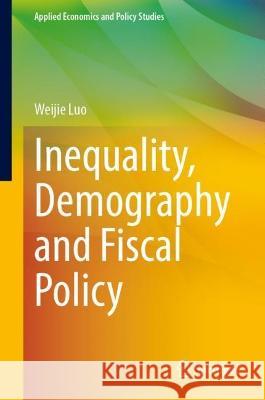Inequality, Demography and Fiscal Policy » książka
Inequality, Demography and Fiscal Policy
ISBN-13: 9789819905171 / Angielski / Twarda / 2023
Inequality, Demography and Fiscal Policy
ISBN-13: 9789819905171 / Angielski / Twarda / 2023
(netto: 458,96 VAT: 5%)
Najniższa cena z 30 dni: 462,63
ok. 16-18 dni roboczych.
Darmowa dostawa!
This book aims to empirically and theoretically study how income inequality and demographic change affected fiscal policy and subsequent economic growth globally in the past decades from four perspectives. First, it briefly reviews the dynamic changes of income sources that contribute to inequality. Second, it distinguishes between income inequality induced by differences in labor productivity and income inequality induced by differences in capital income. Third, it briefly reviews the dynamic changes of tax composition in the age of demographic change. Last, it discusses the impacts of changes in age structure on the extent of taxes on income relative to expenditure. This book offers a comprehensive discussion to understand and analyze the reason, performance and challenge of fiscal policy and economic growth from the perspective of inequality and demographics.In addition to students, teachers and researchers in the areas of equity, demography, political economy and economic policy, this book is also of great interest to policy makers, planners and non-government agencies who are concerned with understanding and addressing poverty-related and aging-related issues in developed and developing countries.
This book aims to empirically and theoretically study how income inequality and demographic change affected fiscal policy and subsequent economic growth globally in the past decades from four perspectives. First, it briefly reviews the dynamic changes of income sources that contribute to inequality. Second, it distinguishes between income inequality induced by differences in labor productivity and income inequality induced by differences in capital income. Third, it briefly reviews the dynamic changes of tax composition in the age of demographic change. Last, it discusses the impacts of changes in age structure on the extent of taxes on income relative to expenditure. This book offers a comprehensive discussion to understand and analyze the reason, performance and challenge of fiscal policy and economic growth from the perspective of inequality and demographics.











